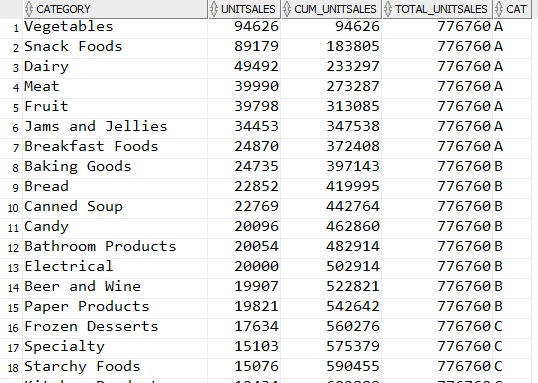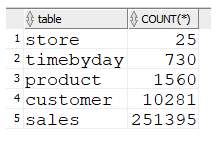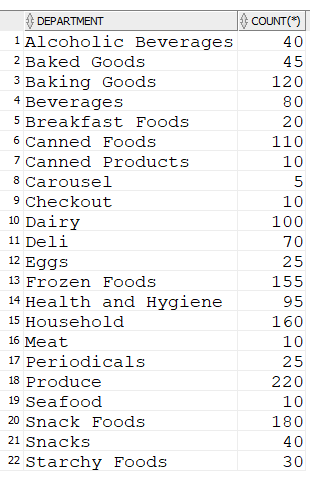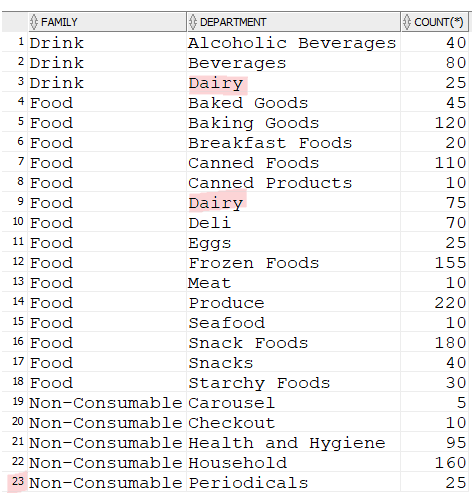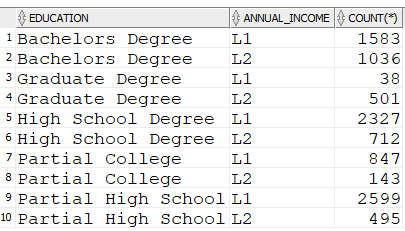Datenumfänge
SELECT 'customer' AS "table", count(*) AS anzahl FROM customer
union
SELECT 'sales' AS "table", count(*) AS anzahl FROM sales
union
SELECT 'store' AS "table", count(*) AS anzahl FROM store
union
SELECT 'product' AS "table", count(*) AS anzahl FROM product
union
SELECT 'timebyday' AS "table", count(*) AS anzahl FROM timebyday
ORDER BY anzahl;
Umsatz pro Jahr und Land
SELECT country, tyear, sum(unitsales)
FROM sales s
JOIN timebyday tbd ON tbd.timeid=s.timeid
JOIN customer c ON c.customerid=s.customerid
GROUP BY country, tyear;

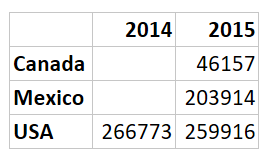
Analyse Produkthierarchie 1
SELECT family, count(*)
FROM product
GROUP BY family
ORDER BY family;
SELECT department, count(*)
FROM product
GROUP BY department
ORDER BY department;
SELECT family, department, count(*)
FROM product
GROUP BY family, department
ORDER BY family, department;
Analyse Produkthierarchie 2
SELECT department
FROM
(SELECT family, department
FROM product
GROUP BY family, department)
GROUP BY department
HAVING count(*)>1;
Kundenanalyse
SELECT education,
CASE
WHEN yearlyincome
in ('$10K - $30K', '$30K - $50K', '$50K - $70K')
THEN 'L1'
ELSE 'L2'
END AS annual_income, count(*)
FROM customer
GROUP BY
education,
CASE
WHEN yearlyincome
in ('$10K - $30K', '$30K - $50K', '$50K - $70K')
THEN 'L1'
ELSE 'L2'
END
ORDER BY education, annual_income;
Top 3 aus 2014 - Vergleich mit 2015
WITH p3top AS (
SELECT productid, sum(unitsales) AS sales2014
FROM sales s JOIN timebyday t ON s.timeid=t.timeid
WHERE tyear=2014
GROUP BY productid
ORDER BY sum(unitsales) desc fetch first 3 rows only
)
SELECT
s.productid, sales2014, sum(unitsales) AS sales2015,
sum(unitsales) - sales2014 AS diff
FROM sales s
JOIN timebyday t ON s.timeid=t.timeid
JOIN p3top ON s.productid=p3top.productid
WHERE tyear=2015
GROUP BY s.productid, sales2014
ORDER BY s.productid;
Prozentualer Anteil
WITH
basecube AS (
SELECT
family, tyear, tmonthnumber,
sum(unitsales) AS unitsales
FROM sales s
JOIN timebyday tbd ON tbd.timeid=s.timeid
JOIN product p ON p.productid=s.productid
GROUP BY tyear, tmonthnumber, family
)
SELECT
tyear, tmonthnumber, family, unitsales,
sum(unitsales) OVER(PARTITION BY tyear, tmonthnumber) AS total_month,
round(unitsales/sum(unitsales) OVER(PARTITION BY tyear, tmonthnumber), 3) * 100
AS percent_of_month,
sum(unitsales) OVER() AS total,
round(unitsales/sum(unitsales) OVER(), 3) * 100 AS percent_of_total
FROM basecube
ORDER BY tyear, tmonthnumber, family;
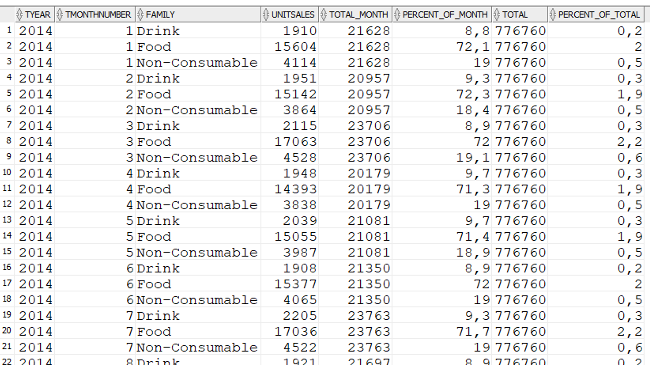
Kumulative Summe
WITH
basecube AS (
SELECT
tyear, tmonthnumber,
sum(unitsales) AS unitsales
FROM sales s
JOIN timebyday tbd ON tbd.timeid=s.timeid
JOIN product p ON p.productid=s.productid
GROUP BY tyear, tmonthnumber
)
SELECT
tmonthnumber, unitsales,
sum(unitsales) OVER(ORDER BY tmonthnumber)
AS cumulative
FROM basecube
WHERE tyear=2014
ORDER BY tmonthnumber;
Kumulative Summe pro Gruppe
WITH
basecube AS (
SELECT
family, tyear, tmonthnumber,
sum(unitsales) AS unitsales
FROM sales s
JOIN timebyday tbd ON tbd.timeid=s.timeid
JOIN product p ON p.productid=s.productid
GROUP BY family, tyear, tmonthnumber
)
SELECT
family, tmonthnumber, unitsales,
sum(unitsales)
OVER(PARTITION BY family ORDER BY tmonthnumber)
AS cumulative
FROM basecube
WHERE tyear=2014
ORDER BY family, tmonthnumber;
Top 10 Produkte
WITH
basecube AS (
SELECT
pname,
sum(unitsales) AS unitsales
FROM sales s
JOIN product p ON p.productid=s.productid
GROUP BY pname
)
SELECT
rank() OVER(ORDER BY unitsales desc) AS ranklevel,
pname,
unitsales
FROM basecube
ORDER BY ranklevel
FETCH FIRST 10 ROWS ONLY;
ABC-Analyse
WITH
basecube1 AS (
SELECT
category,
sum(unitsales) AS unitsales
FROM sales s
JOIN product p ON p.productid=s.productid
GROUP BY category
),
basecube2 AS (
SELECT
category,
unitsales,
sum(unitsales) OVER(ORDER BY unitsales desc) AS cum_unitsales,
sum(unitsales) OVER() AS total_unitsales
FROM basecube1
)
SELECT
category, unitsales, cum_unitsales, total_unitsales,
case
WHEN cum_unitsales < 0.5 * total_unitsales THEN 'A'
WHEN cum_unitsales < 0.7 * total_unitsales THEN 'B'
ELSE 'C'
END AS cat
FROM basecube2
ORDER BY unitsales desc;
